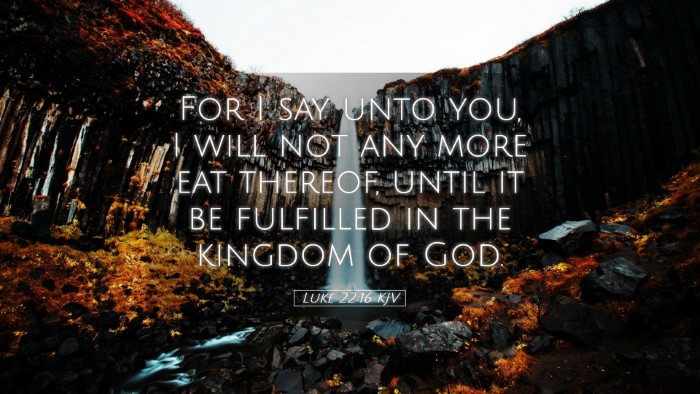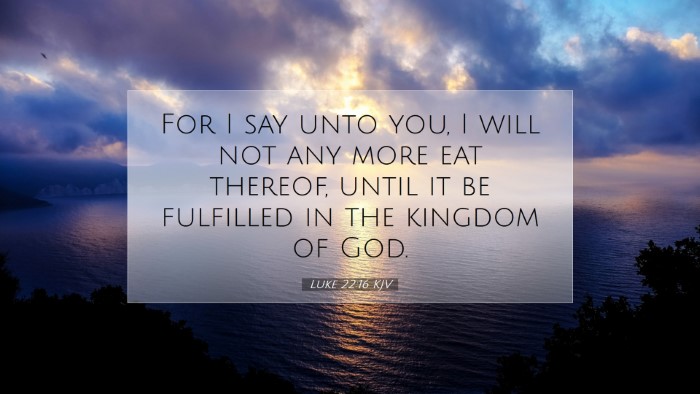Commentary on Luke 22:16
Verse: "For I say unto you, I will not any more eat thereof, until it be fulfilled in the kingdom of God." - Luke 22:16
Introduction
This profound statement from Luke 22:16 is contextualized during the Last Supper, a pivotal moment in Christian theology. Here, Jesus prepares to institute the Eucharist while foreshadowing His imminent sacrifice. The combination of insights from renowned commentators such as Matthew Henry, Albert Barnes, and Adam Clarke helps unravel the richness of this verse, offering theological depth and practical applications for modern readers.
The Significance of the Supper
Matthew Henry emphasizes the importance of the Passover meal being fulfilled in Christ. This Passover was not merely a Jewish tradition; it prefigured the ultimate sacrifice of Jesus. In stating that He will not eat again until the fulfilment in the kingdom of God, Henry highlights Jesus' looking forward to the eschatological banquet, representing the consummation of God's plan with His followers.
Albert Barnes adds a dimension of expectancy and assurance to this future hope. He interprets this moment as Jesus' declaration of a mystical communion that will transcend time and space, culminating in the perfect reign of God. Barnes sees Jesus indicating that His current suffering is directly linked to future glory, which should comfort believers who face tribulations.
Adam Clarke provides a thorough examination of the implications of this statement. He suggests the phrase "until it be fulfilled in the kingdom of God" urges believers to reflect on the reality of God’s kingdom as both present and future. Clarke reminds readers that this statement is laden with theological significance, as it speaks to the incomplete nature of the current communion juxtaposed against the promise of future fulfillment in divine fellowship.
Jesus' Manner of Speaking
This humble yet profound declaration from Christ is reflective of His entire ministry. While speaking about the future, Jesus simultaneously affirms His present suffering. Matthew Henry posits that Jesus speaks with a sorrowful heart, indicative of His awareness of the impending events. This acknowledgment serves as a reminder of His sacrificial love and commitment to humanity, even as He prepares for His passion.
Albert Barnes points out that Jesus conveys a sense of solemnity, signaling to His disciples that this is not merely another meal but the last of its kind before His crucifixion. This moment encapsulates the transition from the old covenant to the new, where the significance of the meal shifts from remembrance of historical deliverance to a celebration of spiritual deliverance through Christ's sacrifice.
Adam Clarke reflects on the communicative style of Jesus. He asserts that this statement is not just an announcement but an invitation. By suggesting He will not eat until it is fulfilled, Jesus compels His followers to anticipate the fulfillment of God’s promises, urging them to participate in His mission to establish the kingdom of God on earth.
The Eschatological Banquet
The theme of the banquet is a prevalent motif in biblical literature, symbolizing unity with God and the ultimate joy that awaits believers. Matthew Henry asserts that Jesus' declaration implies a future feast in God’s kingdom, drawing parallels to the messianic banquet that is prophesied (Isaiah 25:6-8). This eschatological view offers hope and assurance, portraying salvation as a future celebration in harmony with God.
Albert Barnes further develops this idea by highlighting the joyous aspect of the kingdom of God. He connects Jesus' statement to the parable of the great dinner (Luke 14:16-24), where all are invited, indicating the inclusivity of the gospel. Thus, believers are encouraged to look forward not only to personal gratification but also to a communal joy shared with all of God’s people.
Adam Clarke emphasizes the continuity of the spiritual meals. He interprets the “Kingdom of God” as a comprehensive reality that encompasses the reign of Christ in believers' hearts, the church, and the ultimate coming together at the end of the age. Clarke’s analysis assures that the spiritual nourishment provided by the Eucharist points toward a future reality, enhancing the present experience of God’s grace.
The Application for Today
In contemporary contexts, the implications of Luke 22:16 resonate powerfully with pastors, theologians, and students alike. This verse calls believers to live with an eschatological mindset, balancing present hardships with a robust hope for the future. Matthew Henry's reflections encourage preachers to instill hope in congregations, reminding them of the eternal promises secured through Christ's sacrifices.
Albert Barnes suggests that understanding the context of this meal informs the ministry of the church today. The communion at the table not only recalls the past but also anticipates the future. Pastors are challenged to lead their congregations in a manner that celebrates this dual heritage, invoking a sense of longing for the Kingdom while actively participating in the Spirit's work in the world.
Adam Clarke advocates for a mindset of anticipation and readiness among believers. He emphasizes that the act of communion should transform congregational worship, instilling a sense of divine purpose as followers of Christ. Churches are called to be beacons of hope, extending the invitation of the Kingdom of God to all who seek it, mirroring the inclusivity exhibited in Jesus’ ministry.
Conclusion
Luke 22:16 encapsulates profound theological truths regarding Jesus’ sacrifice, the nature of communion, and the anticipation of the Kingdom of God. Insights from commentaries by Matthew Henry, Albert Barnes, and Adam Clarke collectively enrich our understanding, urging us to reflect on the meaning of this verse in light of both ancient and contemporary experiences. As believers, we are called to participate in the ongoing story of redemption and to live in expectation of the glorious fulfillment of God’s promises.


